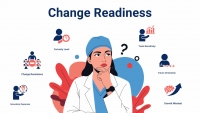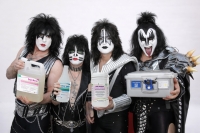
Your Instruments Deserve Better
With soap operas, the absurd is common (long-lost identical twin, anyone?). In the SPD, you would expect concerns to be less outrageous, but it is wise to retain a degree of skepticism and a dose of critical thinking. Sometimes, what’s left unsaid—or undone—requires some serious investigation.
Rinse It All Away
For instance, we all agree that cleaning is the critical first step, but what about the rinse? If you take a shower, shampoo your hair, add a conditioner, then soap up your body, and give yourself only 15 seconds to rinse it all off, are you confident you’d come out clean? Or would you be covered with chemical residue? Most likely you would trust your senses and question anyone who claimed otherwise. Recently, we heard from some of you about white residue you are seeing on instruments and devices, even on the walls of your cart washer and automated washers. Some have told us this residue has prompted them to move from monthly descaling to daily descaling, and they still find residue everywhere on walls, in trays, and on carts. You can simply swipe with a glove on the surface and pick up residue which you may not even see with the naked eye. This is not the outcome you want to see!

Trust But Verify
Yes, detergents are necessary for cleaning and for decontamination of surgical devices, but when is there simply too much of a good thing? Or when are there unintended outcomes? Every so often, new products are introduced with claims that they solve all your problems, meet current standards, and are better than anything else on the market. We heard about the container that doesn’t require dry time and can be put on the shelf for a year, even with moisture, without any concerns about patient safety. It took an intervention from FDA to clarify the terms of the clearance as “immediate use.” Now, we have another dramatic plot line unfolding. The story introduces you to a viscous gel that looks wet, claiming to prevent drying of soils and to meet the standards for long term soak. In fact, as the gel dries, it resembles slime, becomes sticky, and continues to harden over time. At that point, it’s nearly impossible to remove, requiring friction, brushing and even other chemicals to remove, trapping soil and residue like a fly in amber.
Follow The Clues
In short, keep your eyes open for the twists and turns happening in your department. Residue, slime, moisture should not show up in unexpected places. They are clues that there is something amiss. Is there a saboteur in your department? Not likely. When you take charge of the story, you can be sure it ends in a sparkling clean instrument set and successful patient care.
Our Clinical Specialists spend a great deal of time working with customers to track down the clues and solve these soapy mysteries. Do you have a question for them? Leave a comment below or Contact Us to get to the bottom of the unwanted drama in your SPD.
Visit us anytime at www.casemed.com to learn more about our products and services. We are here to help. Case Medical is a U.S. EPA SAFER CHOICE Partner or the Year for Manufacturer Formulator and recognized in NJ as Innovative Manufacturer of the Year.
Kindest Regards,
